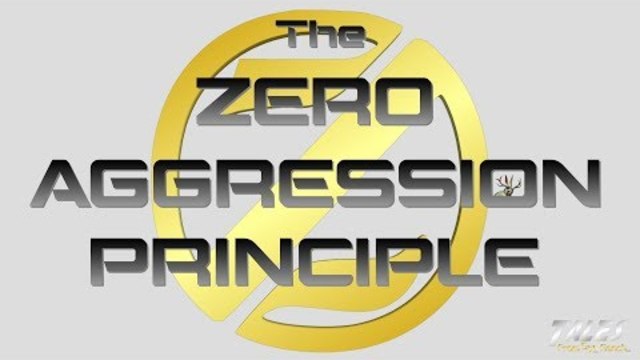NOTE: HubPages rejected this article about this 501 (c) 3 non-profit public education organization for being “overly promotional.”
Commentary From Your Libertarian Opinionizer
The Zero Aggression Project (ZAP) is a libertarian strategy for creating a future free voluntaryist society. Its proponents are libertarian voluntaryists who call themselves “Post-Statists.” The primary goal of the project is to communicate with libertarians on how to communicate with other libertarians on how to communicate with non–libertarians.
Got that?
As indicated by its name Zero Aggression means zero aggression, period, and that applies to government aggression just as much as all other sources of aggression.
Post-Statist Libertarianism
ZAP doesn’t advocate a minarchist “night-watchman” form of government that retains just enough tax-funding to support a military, police presence and law courts. Yet it does support a government.
It also means that ZAP does not support an anarchist society as implied by its “Post-Statism” commitment. ZAP supports a fully voluntaryist libertarian society based on the non-aggression principle (NAP), or what they prefer to call the Zero-Aggression Principle because “ZAP” is zestier than “NAP.”
So how can a free, libertarian, fully voluntaryist, post-statist society also support a government? Simple. The people behind the Zero Aggression Project’s post-statist society redefine what they mean by the concept of “government” by turning it into “governance.”
Specifically, they redefine their idea of “government” as “consumer-controlled governance,” a form of self-rule that rejects forced funding, rejects forced power monopolies and rejects so-called “victimless crimes.” The sole justification for any voluntaryist libertarian “government” is one that never initiates force, intimidation or fraud in any way and therefore never violates anyone’s personal or property rights.
“Government,” they contend, is not the same thing as “The State.”
At this point you’re either interested in the Zero Aggression Project or you’re not, and if not everything above is irrelevant. So let’s assume you are interested and press on.
Mental Levers
Jim Babka and Perry Willis, the longtime driving duo behind the project, came to understand that people don’t change other people’s minds; people, just as you did, change their own minds. Since they felt that many libertarian activists never quite understood this truth they developed ZAP as a means of teaching libertarians how to communicate libertarianism to non-libertarians.
To promote and teach The Zero Aggression Principle (ZAP): “No one should initiate force against others or delegate doing so to politicians.”
Their Mission Statement is simple and direct:
To accomplish their mission they’ve created a website filled with “Mental Levers,” the philosophical equivalent of Archimedes’ famous quote about moving the world with “a lever long enough and a fulcrum.” At this writing there are nearly 100 mental levers that people can browse through and learn from, then pass on to their non-libertarian friends in whatever way they choose.
Recently the Zero Aggression Project’s free subscription online newsletter appeared in follower’s inboxes with six “Mental Levers (mind tools)” that deal with an ongoing learning, teaching and communicating situation:
“Libertarianism addresses one serious social problem (identified repeatedly, below). Awareness reprograms a brain—it becomes harder to “unsee” the problem. The insights that create this awareness are “playground level simplicity.” Where needed, they can be developed to PhD philosopher level”
Following is a brief look at these new “mind tools” from Your Libertarian Opinionizer’s perspective. For Jim Babka’s own perspective go to ZAP and read his blog post, “The thing masochists and sadists share in common.”
ZAP identifies the key libertarian idea as “Don’t aggress against others, personally or politically.”
Minarchists, Libertarian Party members and Objectivists all proclaim allegiance to the non-aggression principle but are inconsistent when they carve out at least minimal exceptions for government to use coercion, intimidation and fraud. By ZAP standards these people can charitably be called “emerging voluntaryist libertarians,” close but not there yet.
The “Zero” as opposed to “non” aggression principle was coined by libertarian science fiction author and political activist L. Neil Smith and defined this way on his website, The Libertarian Enterprise:
“Those who act consistently with this principle are libertarians, whether they realize it or not. Those who fail to act consistently with it are not libertarians, regardless of what they may claim.”
This is one significant example of a “playground level simplicity” concept that so many people fail to develop to even an adult level idea, let alone to a “PhD philosopher level” principle. Parents tell their children don’t hit, don’t bully, don’t cheat but expect them to ignore those principles when they become adults.
Mental Lever: What Masochists and Sadists Share
Sadists derive pleasure from inflicting pain on others but don’t want pain inflected on themselves. So they reject coercive force used against themselves.
Masochists derive pleasure from pain inflicted on them by others but want it to end when the pain becomes so excessive it’s no longer pleasurable.
In short, even masochists and sadists reject initiated force when it violates their consent, the same way as every other human being responds.
To use the website’s example, a boxing match is consent; a mugging is not.
What Justifies Defensive Force?
Too many non-libertarians label all “aggression” as “force” and then claim that libertarians are hypocrites when they use “defensive force” as though it’s somehow “aggressive force.” They misunderstand. When libertarians reject aggression they specifically reject “initiated force.” Defensive force is not aggression but the use of force to defend against aggressive, initiated, first strike coercive force.
Libertarians reject any moral right to “throw the first punch” but have the absolute right to throw a punch in defense of themselves or others. Libertarians are neither aggressors nor pacifists but are defenders.
Too many non-libertarians know all of this perfectly well but use fake definitions so they can claim a moral right to initiate attacks against others they don’t like—or get governments to do their dirty work for them—even though they would still hypocritically reject initiated force directed against themselves.
Here’s that playground simplicity again: initiated force bad; defensive force good. Does that really require a PhD to explain it to non-libertarians?
Mental Lever: How is Fraud Like Assault?
To be a libertarian means to reject coercion and intimidation—the latter being the threat of coercion—but many seem not to consider fraud. This seems to be a tough one for libertarians and non-libertarians alike since fraud doesn’t involve any sort of forcing, either initiated or defensive.
Fraud is not about telling little white lies. Fraud is not a “victimless crime;” it’s a crime because it causes a victim to surrender something that the victim would otherwise not voluntarily chose to surrender—damage to or loss of life, limb or property. The Mental Lever for this one explains this very succinctly and well:
“The crime of fraud is initiated force by other means.”
Remember what we teach our children? Don’t hit, bully or cheat. Fraud is just the adult version of cheating. People can take another’s wallet by killing or beating them and taking it (coercion), by threatening to kill or beat them and taking it (intimidation) or surreptitiously picking their pockets and taking it (fraud). The end result is the same.
Mental Lever: The Libertarian Species
This Mental Lever links to a “What is a Libertarian?” question. By asking what “species” a libertarian is the question is really asking what a libertarian is relative to virtually every other philosophical species in today’s world. As a “species” libertarians differ on why they’re libertarian, how to go about creating a libertarian society and what means will be used to peacefully achieve that society.
The primary way that the libertarian species differ is that when they’re presented with a social problem their first and primary questions should always be:
1. Will the proposed solution involve coercion, intimidation or fraud or will it require persuasion, and
2. Will it reduce or expand the level of coercion, intimidation and fraud in society?
Again quoting from the Mental Lever itself:
“This is because libertarians, more than any other political philosophy, are concerned about the means that are used to achieve an end.”
This is yet another facet of libertarianism that few if any non-libertarian ever seems to care or even think about. The usual objections against libertarianism are based on the philosophy being unrealistic, utopian, won’t work, ignores human nature, there has never been a major libertarian country in the history of the world, it doesn’t solve an endless host of intractable problems that are not unique to libertarianism and that no other political system has ever solved either, and if you don’t like government why don’t you move to Somalia?
Yet these same people think that creating coercive governments is a great way to solve social issues. How has that worked out since the beginning of human life on earth?
That libertarians will seek to take direct, peaceful, voluntary action to solve a problem rather than demanding that a government use its coercive powers to force a one-size-fits-all “solution” onto everyone never seems to be a good idea to the vast majority of control-freaks who dominate modern political and philosophical thinking.
In the end there is only one species of libertarian; the voluntary non-coercive species.
Mental Lever: The Libertarian Variety
This Mental Lever is really all about one variety of libertarian, specifically identifying what a voluntary libertarian is all about while ignoring all the other varieties. The Zero Aggression Principle puts it thusly:
“A voluntaryist libertarian believes that all adult relationships should be voluntary.”
This isn’t necessarily true of every variety of libertarian. As previously noted some don’t consistently apply the Zero Aggression Principle, others don’t consistently champion voluntaryism, and others such as consequentialist libertarians even reject the principle altogether. For those who are interested, there are several ways of breaking down the many varieties of libertarianism.
First, the word “libertarian” was originally used by European anarchists in the early 17th century when they began calling themselves “libertarian socialists” rather than “anarchist socialists” to distinguish themselves from “state socialists.” In this context “libertarian socialist” is not an oxymoron as so many American libertarians claim. That’s because most Americans know only the American usage of “Libertarian” as used in “The Modern American Libertarian Movement” which means—opposite of socialism—belief in individualism, free markets and personal property rights.
(There is however a small contingent of “voluntary socialists” acceptable to voluntaryist libertarians. But that’s another story).
The second major differentiation is “right libertarian” vs. “left libertarian.” Sometimes it means socialist libertarians vs. free market libertarians. Other times it simply means right libertarians who care mostly about economics and left libertarians who care mostly about social issues with both kinds accepting the non-aggression principle to a greater or lesser extent.
Within the American libertarian movement there are political and non-political libertarians. Spelling Libertarian with a capital letter “L” typically applies to political Libertarians while spelling it with a lower case letter refers to philosophical libertarians.
Within all of this are labels that libertarians choose to use as self-identifiers for their own particular variety of libertarianism. These include Libertarian Party, Libertarian-Republican, rightwing Libertarian, Leftwing Libertarian, Alt-Libertarian, Anarcho-Libertarian, Voluntaryist, Anarchist, Agorist, Individualist, Objectivist, Post-Statist, Austrians, Bleeding-heart libertarians, Christian libertarians, Civil libertarians, Classical Liberals, Free Market Libertarians, Neolibertarians, Geolibertarians, Green libertarians and many others that can be found by going to Wikipedia and typing “Outline of Libertarians.”
There are so many different varieties of libertarians that in fact every single one is guaranteed to disagree with every other one on at least one point or issue or detail or nitpick or whatever. Libertarianism is, unlike virtually all the others, an individualist-based rather than a collectivist-based belief system.
ZAP Off
Some articles end with the word “End.” Others might conclude with “Share” or “Comment” or “Subscribe.” This one will end by plagiarizing Jim Babka, Co-Founder of the Zero Aggression Project, who is fond of ending his emails, blog posts and other online communications with:
“ZAP The State and have a nice day”
References and Links
ZAP Begins Here An overview of the Zero Aggression Principle for people who know they want to be free and want to help others to find their own freedom but don’t know exactly how to go about accomplishing those goals. This intro should help.
Consumer Controlled Governance Sound Idiotic? Impossible? Improbable? Many ideas sound idiotic when they’re first encountered. Some thought a Constitutional Republic without a King sounded idiotic but Americans didn’t think so.
All the Mental Levers Here Nearly 100 Mental Levers and counting, described as “mini-articles that explain the libertarian philosophy in bite size chunks, usually less than 200 words per idea.” Browse, ponder, pursue, then pass them on.
Mastering libertarian Advocacy Jim Babka offers his seven insights on “How to be a master tactician of libertarianism” to those who want to actively plant philosophical libertarian seeds in the thoughts and values of non-libertarians.
True to its Own Philosophy From ZAP’s About Us page: “We are funded entirely by voluntary contributions from mostly small, one-time donors, monthly credit card pledges, a few larger donors, and even fewer contributions from other foundations.”




















